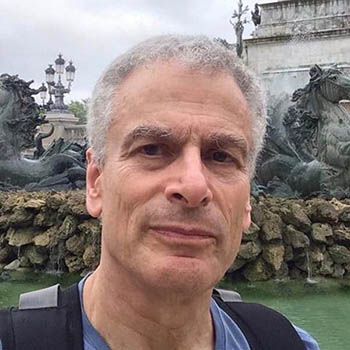
NERS Professor Atzmon retires after 35 years with the department
His research was primarily focused on phase transformations and the mechanical behavior of amorphous and nanocrystalline metal alloys.

His research was primarily focused on phase transformations and the mechanical behavior of amorphous and nanocrystalline metal alloys.
Professor Michael Atzmon joined the U-M Nuclear Engineering and Radiological Sciences (NERS) department in 1987 with research interests in phase transformations far from equilibrium. While his later research focused on the mechanical behavior of amorphous and nanocrystalline metal alloys, he has also worked extensively on diffusion in solids, thin-film microstructure, radiation effects, mechanochemistry, and powder processing by mechanical attrition. A recent highlight of his research has been an atomistic description of plasticity in metallic glasses. Combining experiment and computation, it brought the level of understanding closer to that achieved for crystalline materials decades before.
Professor Atzmon obtained his B.Sc. degree in Physics and Mathematics from the Hebrew University of Jerusalem, Israel, in 1980. Following that, he obtained his MS (1982) and Ph.D. degrees (1985) in Applied Physics from the California Institute of Technology, California. His Ph.D. thesis was titled ‘Study of Amorphous Alloys Formed by Solid-State Reaction in Elemental Composites.’ Professor Atzmon then pursued post-doctoral research for the next two years at Harvard University, Massachusetts, where his research concerned atomic transport in compositionally modulated thin films and the formation of metastable metallic phases by rapid quenching using picosecond laser pulses. During his time at Harvard, he also won the IBM Post-Doctoral Fellowship, one of many prizes and fellowships he won throughout his career. His academic lineage includes Marie Curie.
In 1987, Dr. Atzmon joined the University of Michigan as an Assistant Professor and was promoted to Associate Professor six years later. Since 2006, he has been a Professor at UM and has taught many courses, including Nuclear Engineering Materials, Nuclear Fuels and Ion-beam Modification and Analysis of Materials. One of his former doctoral students, Dr. Tianjiao Lei, said, “It has been a pleasure and privilege to work with Prof. Michael Atzmon over the years while I was at the University of Michigan. He is a brilliant scientist and a great mentor. He made himself available to me whenever I needed someone to talk to. His attitude toward research has greatly impacted me, and he is one of the biggest reasons I am pursuing my career path in academia. I am very proud to be one of his students.” Professor Atzmon directed the undergraduate degree program in Engineering Physics for nearly two decades, during which the enrollment doubled.
In his professional career, Professor Atzmon has been Associate Editor at the Journal of Nonequilibrium Processing, in the 1990s. He has been a member of Scientific Committee of the Third International Conference on Advances in Mechanical Engineering and Mechanics (ICAMEM 2006) in 2006, Steering Committee of the International Symposium on Metastable and Nanomaterials since 2001, US Advisory Committee, Bulk Metallic Glass International Conference (BMG XI) in 2016, and Executive Committee, Frontiers in Materials Processing, Applications, Research and Technology (FiMPART) in 2017. He also served as the President of the International Mechanochemical Association, from 2000-2006. Professor Atzmon was the Chair of the International Symposium on Metastable, Mechanically Alloyed and Nanocrystalline Materials, held in Ann Arbor in 2001. It was attended by approximately 140 participants from 29 countries. He was By-Fellow at Churchill College, University of Cambridge, United Kingdom. At the University of Michigan, Professor Atzmon was elected Senior Fellow at the Michigan Society of Fellows and to the Senate Advisory Committee on University Affairs. He received awards for research and service from the NERS Department and the College of Engineering.
In 1987, Professor Atzmon received a patent for his research on “Metastable Alloy Materials Formed by Solid-State Reaction of Compacted Mechanically Deformed Mixtures”. Throughout his professional career, he has authored and co-authored numerous highly-cited papers, edited three books and has been an invited speaker at nearly seventy national and international conferences. Professor Atzmon’s research was funded mainly by the National Science Foundation, nearly continuously over his entire career. He made significant contributions to NERS through research, teaching and mentorship, and exemplary service. On December 31, 2022, he retired from active faculty status in NERS.